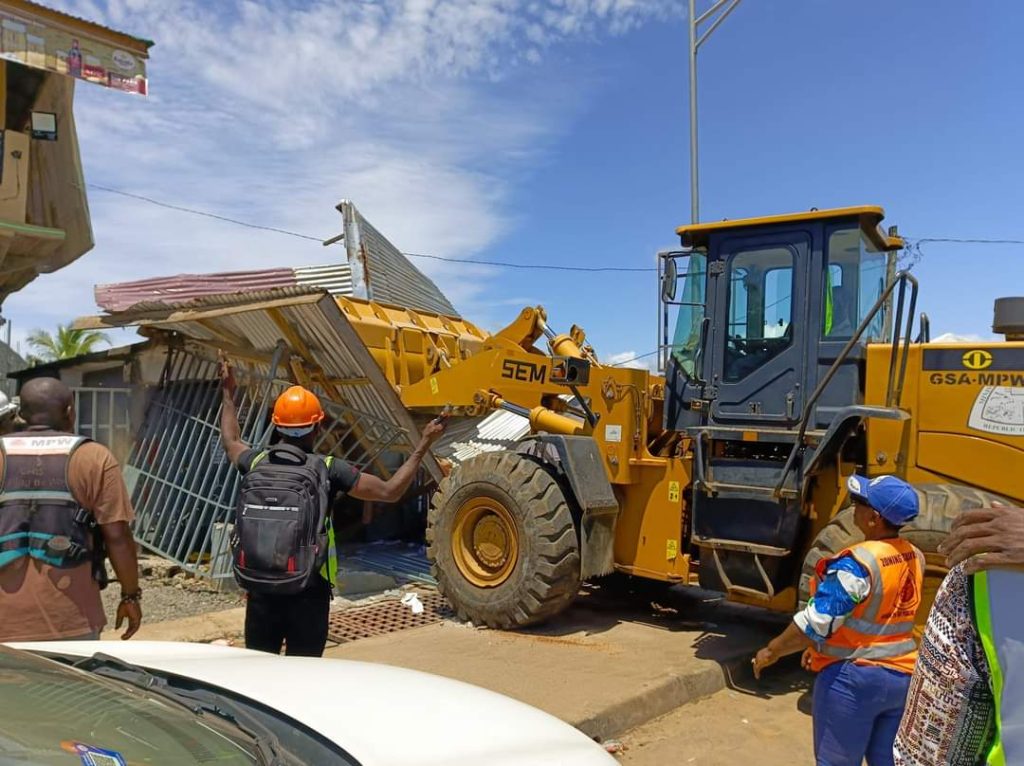The Liberian government has initiated demolition activities as part of the preparation for the construction of the country’s first overhead bridges along Tubman Boulevard and SKD Boulevard Junction, focusing on easing traffic congestion and upgrading infrastructure. Spearheaded by the Ministry of Public Works, this demolition is regarded as a necessary step toward facilitating future construction, intended to begin in February 2025. Despite these intentions, the actions have sparked significant outcry from local residents and squatters who are facing the immediate consequences of these demolitions, which complicates their living situations and businesses.
Mr. Abraham Rahim Bility, the Assistant Minister for Planning, Program, and Research at the Ministry of Public Works, oversees these operations and has emphasized that residents were informed about the plans beforehand. While private property owners have reportedly been compensated, squatters have been given an ultimatum to vacate their makeshift homes or risk demolition by the workers equipped with machinery for the task. Bility’s statements reveal a government commitment to ensure compliance by residents in the affected areas, stating that cooperation from local inhabitants has been observed thus far, although the level of cooperation remains debatable, given the reactions from those displaced.
The disappointment among affected individuals paints a stark contrast to the government’s development aims. Local workers, such as barber Edmund Kerkulah, describe the demolitions as harsh and lacking in proper compensation, presenting significant challenges to their livelihoods. Kerkulah expressed feelings of frustration and despair, emphasizing that no adequate notice nor support was provided to help them adjust to the impending loss of their businesses. The sentiments reflect a broader narrative of disenfranchisement among squatters and low-income residents who rely on informal settlements as a means of subsistence.
Additionally, concerns extend to other displaced residents like Hawa Kanneh, who voiced fears for the future of her antiquated roadside business selling rubber dishes and lamented the absence of alternatives following the demolition of her makeshift shop. The psychological toll on those losing their source of income is palpable, as many face uncertainty regarding where they will relocate or how they will rebuild. The demolition site, stretching from ELWA Junction to Musu’s Spot in Congo Town, showcases not just the physical destruction of structures but the dismantling of livelihoods that people have built.
Benjamin Myers, the Director of Communication at the Ministry of Public Works, described the demolition as a significant milestone for Liberia’s infrastructural development and acknowledged financial backing from the People’s Republic of China for the upcoming construction. Myers positioned these efforts within a broader narrative of partnership and support, underscoring the government’s aspirations to improve traffic systems and enhance infrastructure as vital aspects of the country’s development strategy. However, the stark reality experienced by residents raises questions about the prioritization of infrastructure over human socioeconomic needs.
The juxtaposition of government ambition to invest in infrastructure against the immediate needs and rights of those affected by such developments reflects a common tension in urban development initiatives. As preparations for the overhead bridges progress to clear the right-of-way, the government’s actions prompt deeper discussions surrounding property rights, compensation, and community engagement. The Liberian government may need to reassess its approach to ensure that development projects consider those directly impacted, mitigating the adversities faced by local communities. Effective communication, fair compensation, and alternative support for displaced residents may foster goodwill and support for the government’s ambitious infrastructural goals in the long term.


